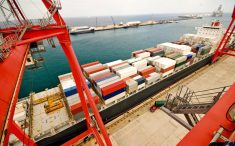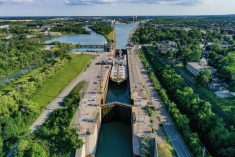Striking longshore workers and their management are “finalizing details” for work to resume at Canada’s West Coast ports after a tentative deal was reached Thursday.
The B.C. Maritime Employers Association said in a release Thursday morning it had reached a tentative pact with the International Longshore and Warehouse Union (ILWU Canada) on a new four-year collective agreement “that recognizes the skills and efforts of B.C.’s waterfront workforce.”
The deal ending a 13-day strike came after federal Labour Minister Seamus O’Regan on Tuesday night tasked federally appointed mediators with drafting terms for a new agreement based on progress made in talks to date.
Read Also

More Canadian companies at Agritechnica 2025
A record number of Canadian agriculture machinery and tech companies are at Agritechnica 2025, with exporters being more aggresive looking for new markets.
O’Regan had set a deadline of Thursday evening for the union and management to decide whether the mediator’s terms were acceptable.
He and federal Transport Minister Omar Alghabra, in a joint statement Thursday, said the ILWU and BCMEA are now “finalizing details for the resumption of work at the ports.”
BCMEA said Thursday morning it’s “committed to working closely with ILWU Canada and their locals and supply chain partners to safely resume operations as soon as possible.”
Thanking federal mediator Peter Simpson and his team as well as O’Regan for their help in reaching the tentative deal, the employer group said it “recognizes and regrets the significant impact this labour disruption has had on the economy, businesses, workers, customers and ultimately, all Canadians.”
Parties at Vancouver and Prince Rupert now “must collectively work together to not only restore cargo operations as quickly and safely as possible but to also rebuild the reputation of Canada’s largest gateway and ensure supply chain stability and resilience for the future,” BCMEA said.
O’Regan and Alghabra, in their statement Thursday, concurred that the scale of the disruption at the West Coast has been “significant” and “has shown just how important the relationship between industry and labour is to our national interest. Our supply chains and our economy depend on it.”
Service for bulk grain vessels and cruise ships at B.C.’s ports was exempt from this work stoppage. However, several farmer and ag industry groups had publicly called for federal action to end the strike, as containerized pulse crops, perishables such as meat and produce, fertilizer and other goods were potentially at risk from delays.
Past that, Canadian Manufacturers and Exporters (CME) said in a separate release Thursday the strike “has caused severe backlogs that will take weeks to process. The damage to manufacturing supply chains is significant, as production slowed in the lead-up to the strike and will take even more time to get back up and running.”
CME said it’s been estimated that a day of a port shutdown takes up to a week to make up, “meaning it will take months for the sector to recover.”
O’Regan and Alghabra emphasized Thursday that “deals like this, made between parties at the collective bargaining table…are the best way to preserve the long-term stability of Canada’s economy” and “we do not want to be back here again.” — Glacier FarmMedia Network














